
By Aaron Tay, Head, Data Services
Happy new year!
To mark the beginning of the year, here is my look back to 3 interesting new research related tools from Google that I found in 2024 that can help optimize your research workflow.
- Google Scholar PDF Reader -- useful Chrome extension companion for reading PDF scholarly papers
- Google NotebookLM, illuminate.google.com -- Podcast creator
- Google AI Studio -- Playground for Google's latest experimental Gemini Models
All 3 tools are free at the time of writing.
1. Google Scholar PDF Reader -- useful light weight Chrome extension companion for reading PDF scholarly papers
First up is Google Scholar PDF Reader, this is a new Chrome browser extension that optimizes your reading experience of PDFs of Scholarly papers from the web.
Note: This is distinct from the more well-known Google Scholar Button extension which helps you find full text via Google Scholar, and you can run both together or separately as they have distinct functionality.
On the surface the features of this extension look minor, but they help make reading academic papers much easier when you open pdfs via the Chrome browser extension and I have gotten so used to them, it feels odd when I read papers without them.
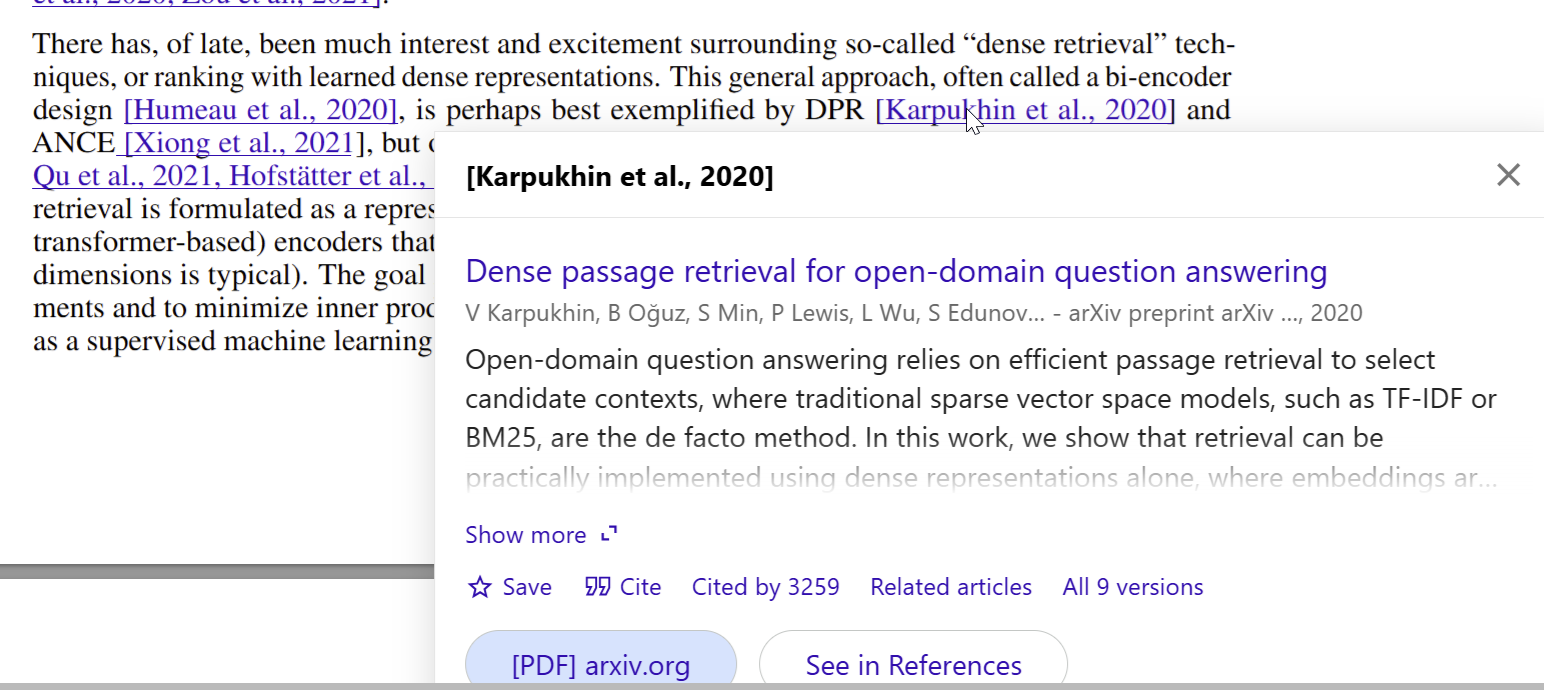
The first major feature of this Chrome extension is that when you mouse over and click on citations, it expands to show you more context about citations. This works also for numbered references which have even less context.
I find this really useful to confirm if a citation is really a paper I half remembered or to quickly decide if I might want to follow up on the paper without losing my place in the text.
It also works well for jumping to and from in-text figures and tables as well.
Another key feature is the "AI outline" option, which sits atop the PDF's table of contents. "AI" is utilised to create a summary for each section.
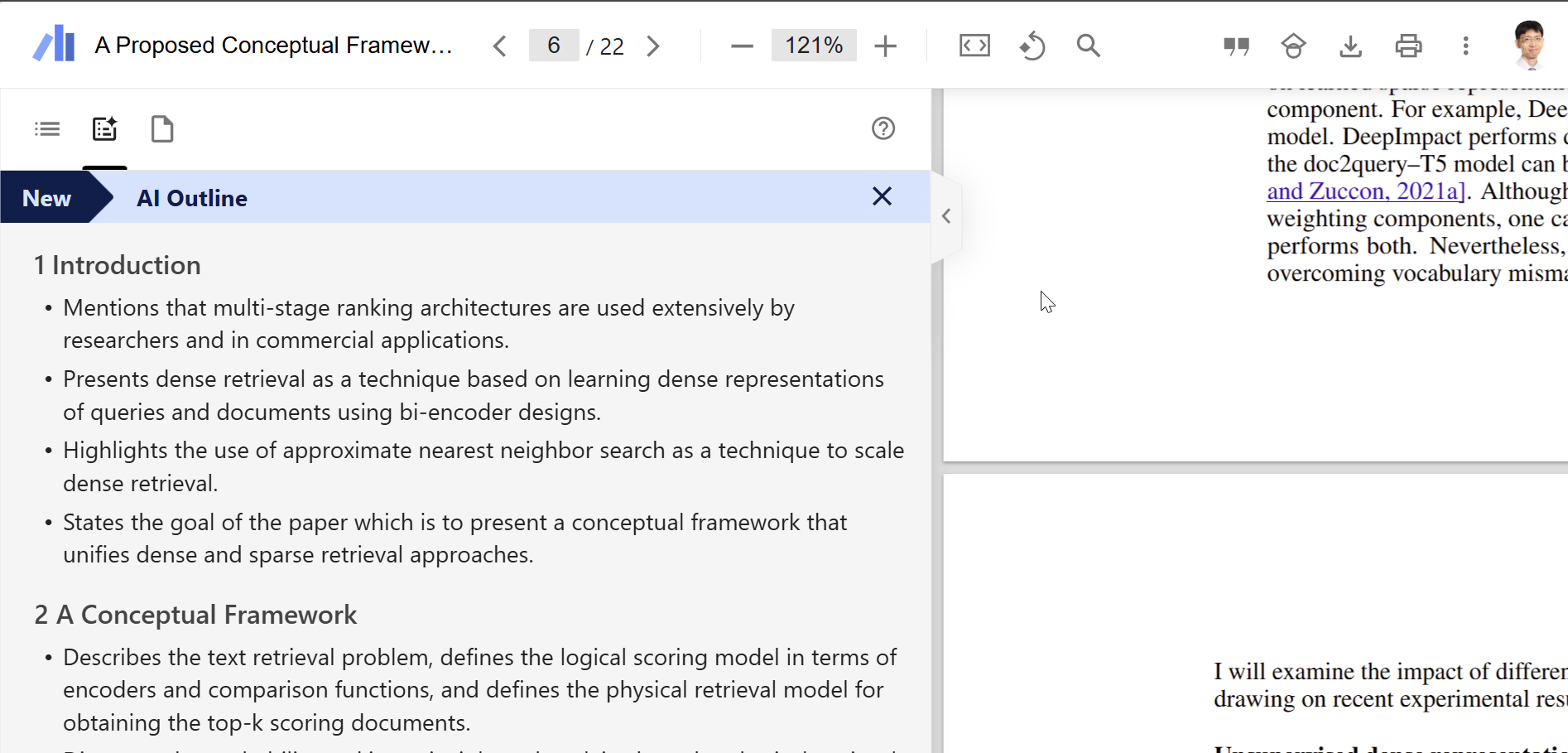
The document states that "AI outlines present the main points for major sections of the document." and are generated by a computer and may be inaccurate or incomplete. You can also choose for the system to request an AI outline from Google either
- Only when you click the button
- "Automatically when you open a PDF on most academic sites" or
- "Automatically when you open any PDF"
Other minor features of this extension includes night/dark mode in the interface, Copy and paste by common citation style and saving of articles to your Scholar Library to read later.
2. Google NotebookLM, illuminate.google.com
Interested in using the latest language models like Gemini 2.0 Flash to summarise and extract information from up to 50 different sources? You will want to use the free Google NotebookLM which has many tricks up its sleeve.
First off choose your sources of what to upload.
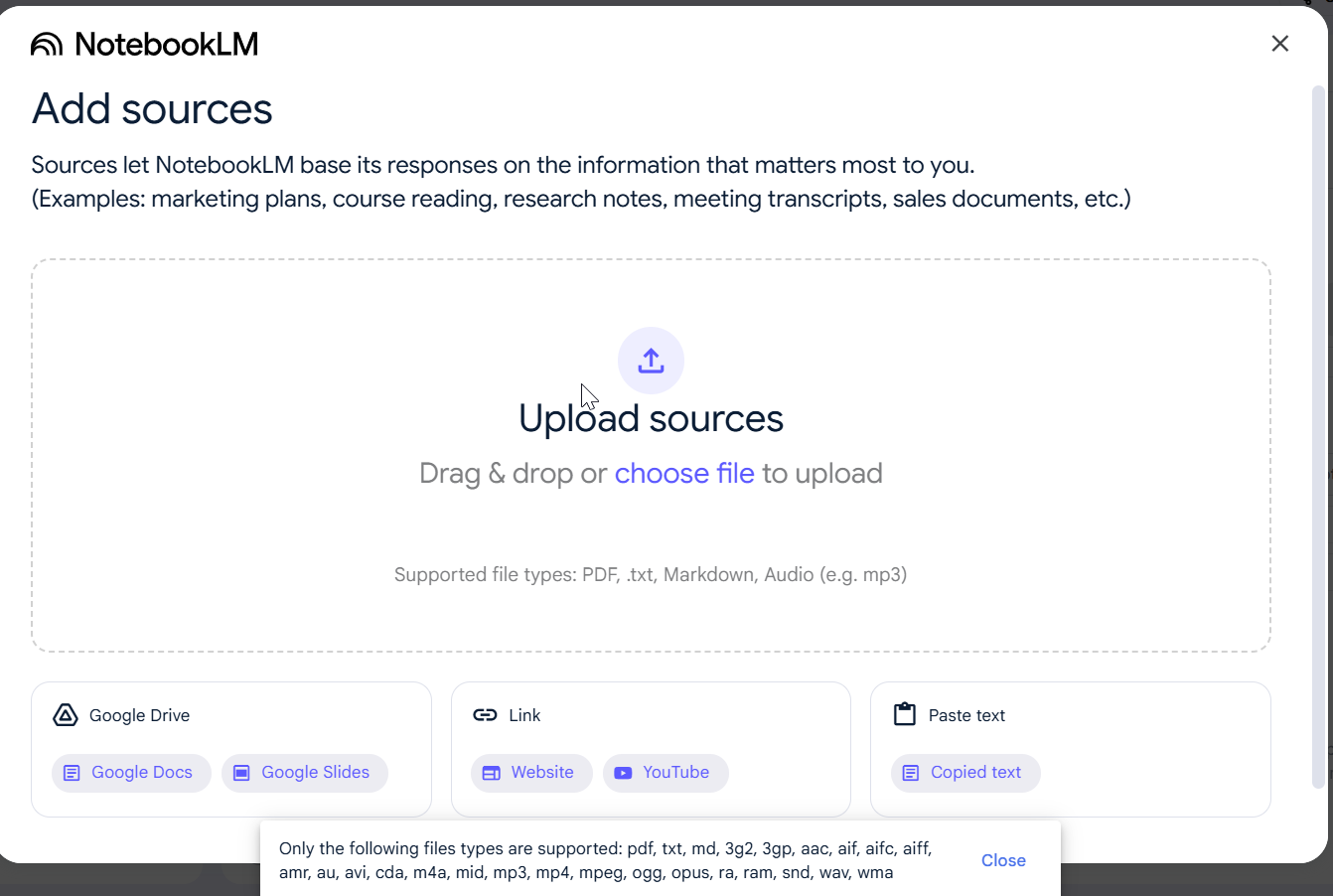
You have a wide variety of ways to add sources, e.g. from Google Docs/Slides, via URLs of webpages or YouTube or just files from your local computer.
You are also limited not just to txt files but also PDF, MarkDown even different Audio files like mp3, Wav, mp4, mpeg etc.
Word of caution: The legal issues relating to the use of IP or copyrighted content in AI extraction tools are still unresolved and unclear, please exercise caution when using such tools and refer to our recently updated Appropriate Use Of Electronic Resources Policy.
In my example, I have chosen to upload journal articles and preprint in PDF around a given subject I am studying.
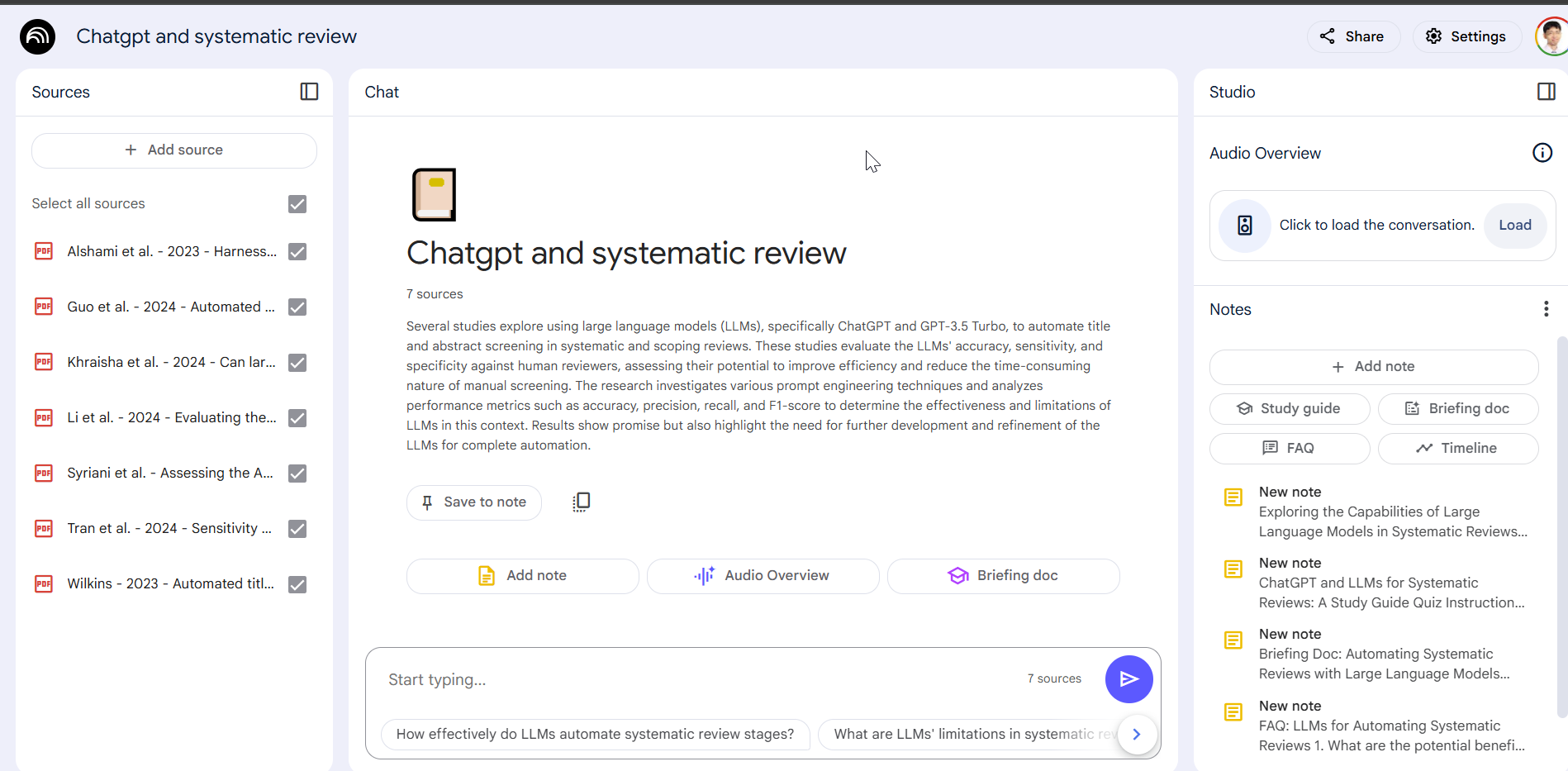
Once you have your sources loaded, you can use some of the prebuild options like clicking on the "Study guide", "Briefing doc", "FAQ" or "Timeline" options (under Studio panel) to create notes.
Below shows an example of a generated briefing doc.
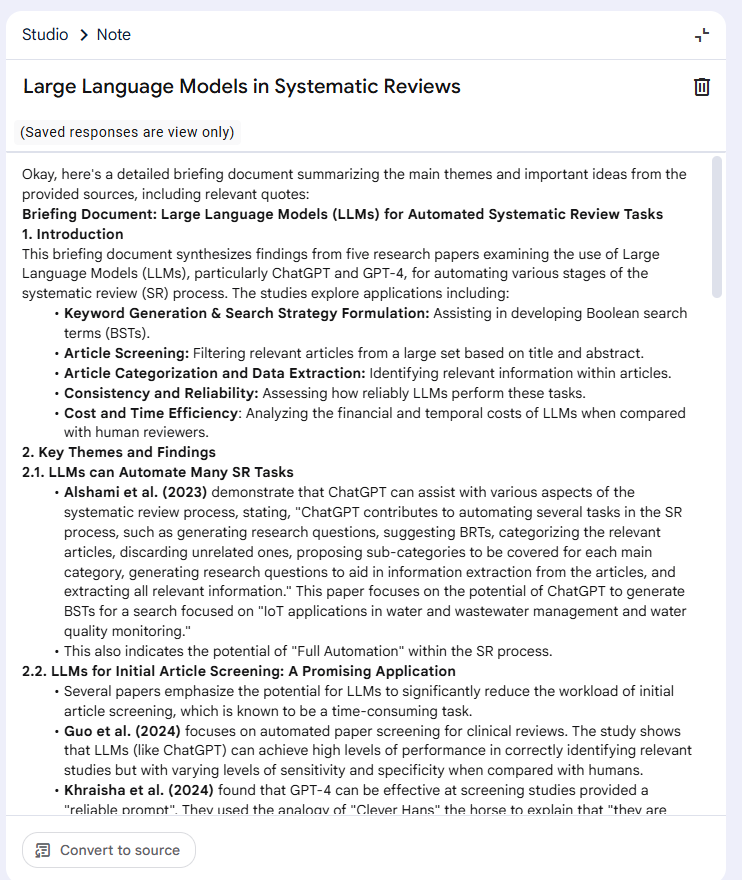
I personally prefer to ask my own questions in the chat panel. For example, I can click on one of the suggested questions or type my own.
For instance, in the example below, I asked Google NotebookLM to generate a table with the required headings (i.e., the accuracy, recall/sensitivity, and F1 scores achieved by the LLM in each study).
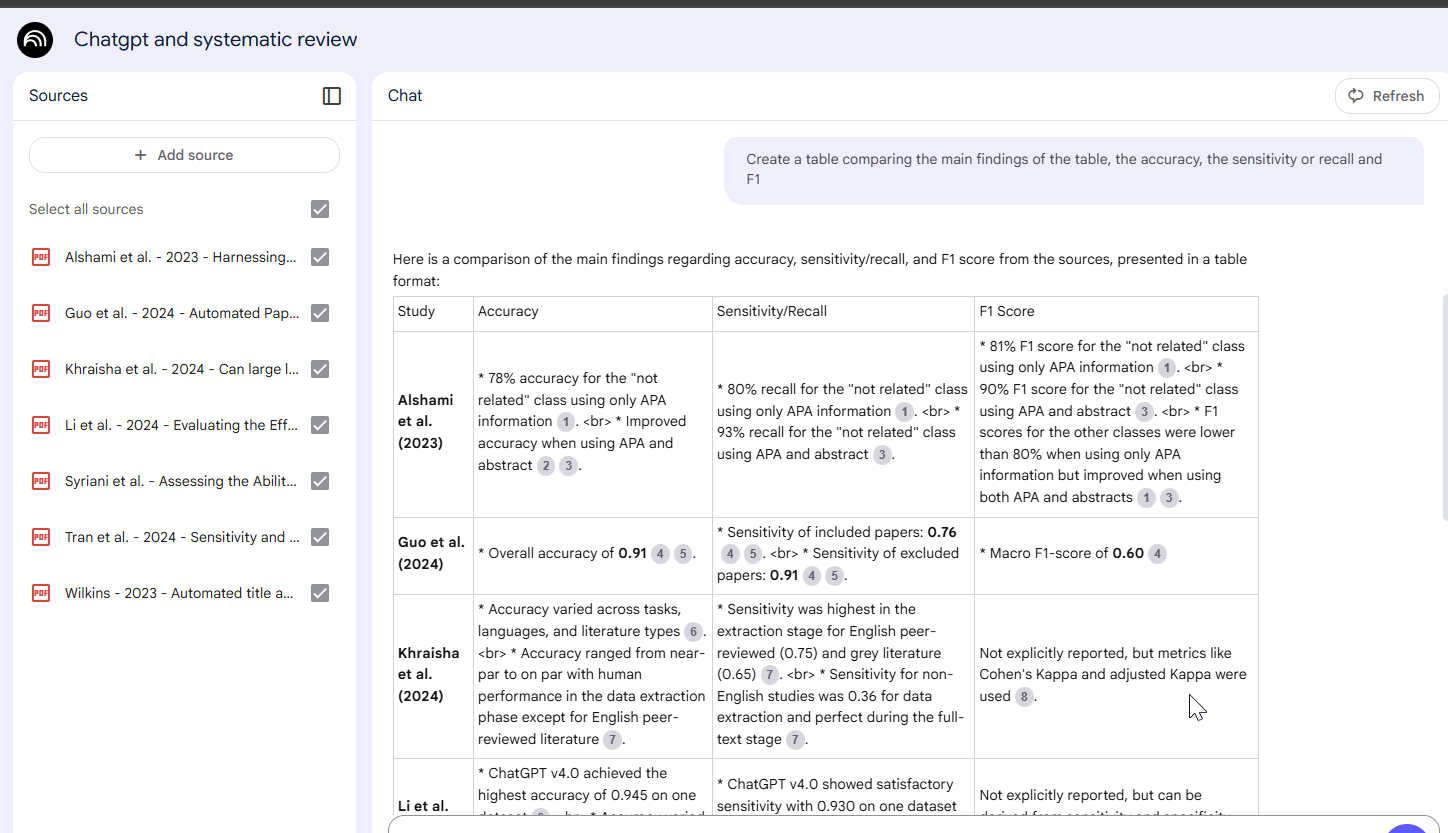
While the generated table looks reasonable, do not take the results at face value, as the system might still "hallucinate" and produce inaccurate answers.
As such, you should check by clicking on the numbers at the end of each sentence to verify against the source (the text which was used to extract the answer).
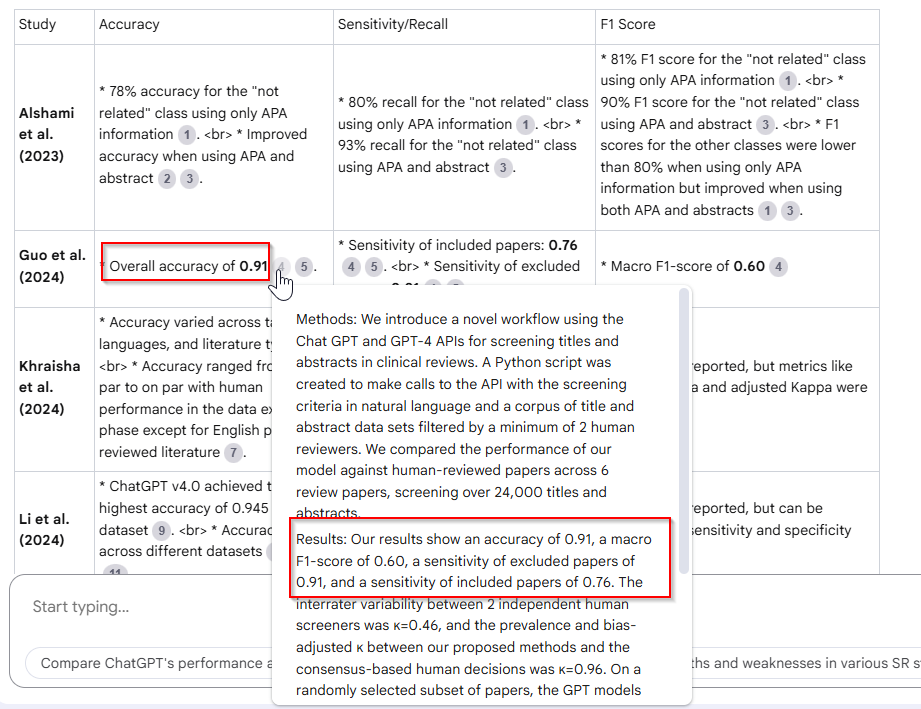
Audio overviews or creating engaging podcasts
Tired of reading text? How about auto generating a "podcast" with two hosts discussing the content you uploaded? That is the pitch of the "Audio Overviews" feature in Google NotebookLM.
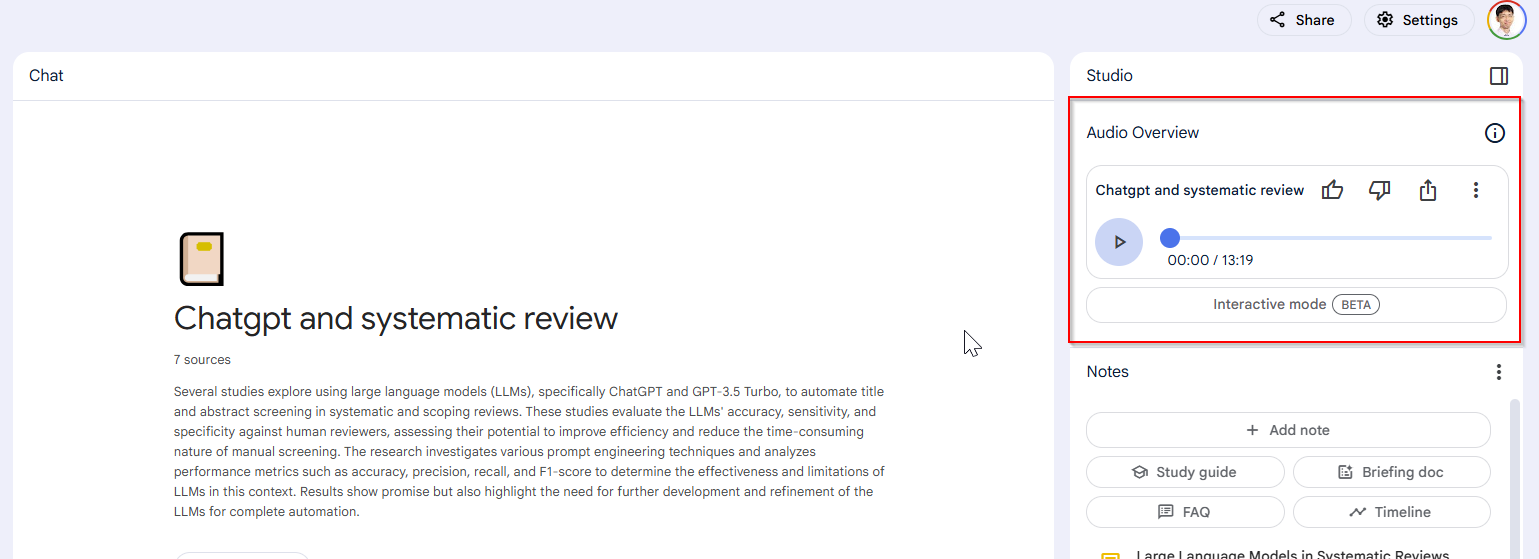
You can create the podcast out of any content but the obvious use for us is to put in PDFs of papers. You can even share the podcast publicly.
Here is one based on just one paper (you can also try for multiple papers)- the famous paper -- Attention is all you need (the paper that proposed the transformer model which is core to the current AI revolution).
If you listen to it, you will find that the podcast tends to assume the audience are laypersons and tries to simplify (possibly overly simplify) the content of the source, often by drawing analogies (which are not in the paper) that may or may not be helpful. In general, I find that the AI overview often discusses related topics even though the source itself may not mention them.
You have a chance to try to mitigate this by clicking the customize button and adding instructions (see below).
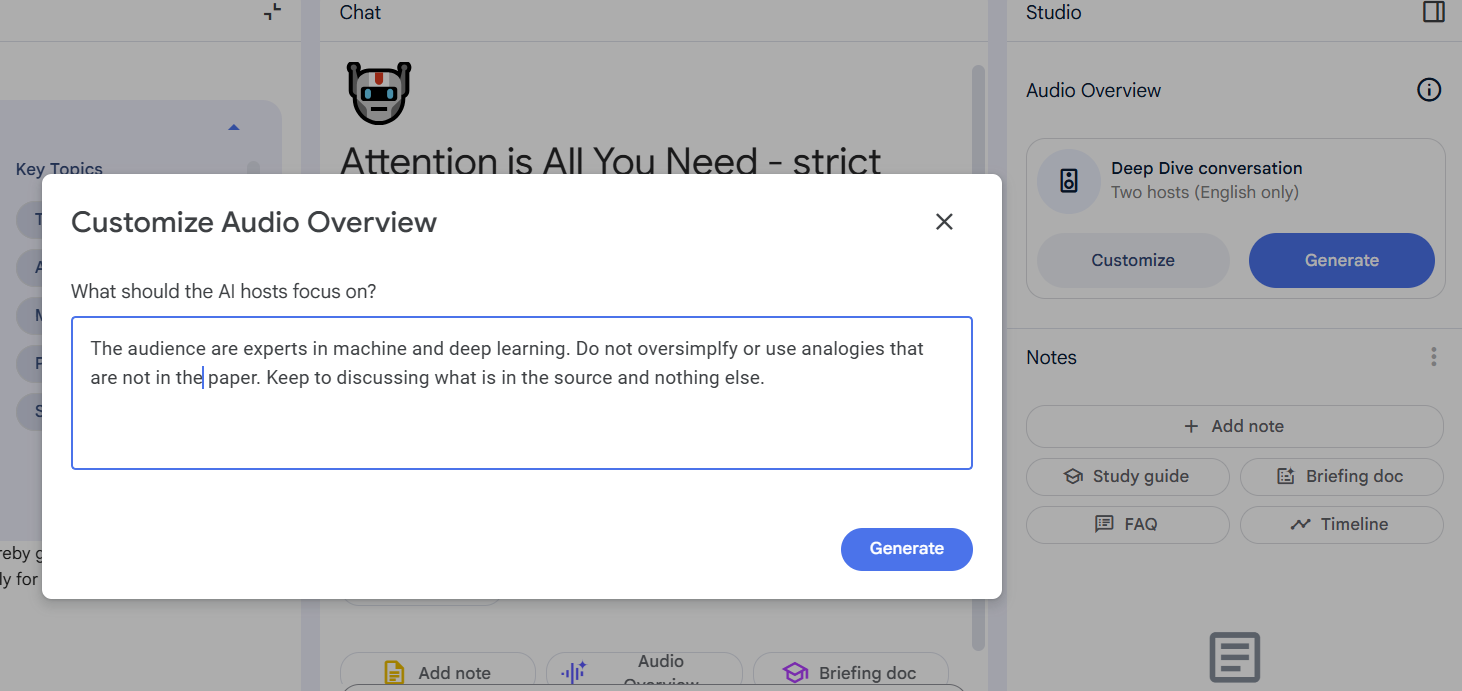
With the customization above, this is how the podcast sounds like which is far more technical, for example goes into details of the K,Q, V self-attention mechanism and sticks close to the paper.
Want more fun? There is now a new beta Interactive feature that allows you to "call in" and ask questions to the hosts!
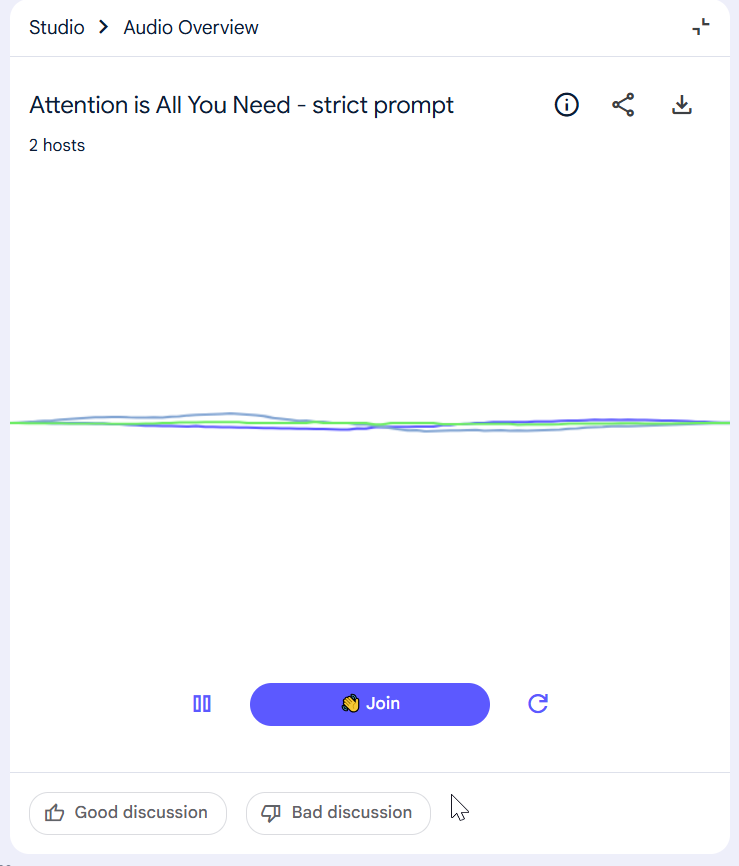
Interestingly, Google also has a similar specialized service called Illuminate. It is designed for scientific papers and much more limited in what input it can accept compared to Google NotebookLM. But it does allow you to select the voices of two hosts.

More importantly, by default, I find the hosts' discussion of PDF papers to be much more in-depth and strictly follows the content in the paper without going off on tangents.
Here for example is Illuminate.org's podcast on the same Attention is all you need paper.
Another alternative to Illuminate is to use SciSpace's podcast feature; however, like Illuminate, this is strictly for research papers only, whereas Google NotebookLM covers everything from audio files and YouTube videos to slides in PDF and more.

3. Google AI Studio -- Playground for Google's latest experimental Gemini Models
The Gemini models are Google's answer to OpenAI's GPT models and Anthrophic's Claude models.
It seems logical then that the best place to access Gemini's models is at https://gemini.google.com/ . However, a lesser-known fact is that in fact you should also use Google AI Studio as it offers you access to the latest Google's offerings in LLM with more settings even without a subscription to Gemini advanced.
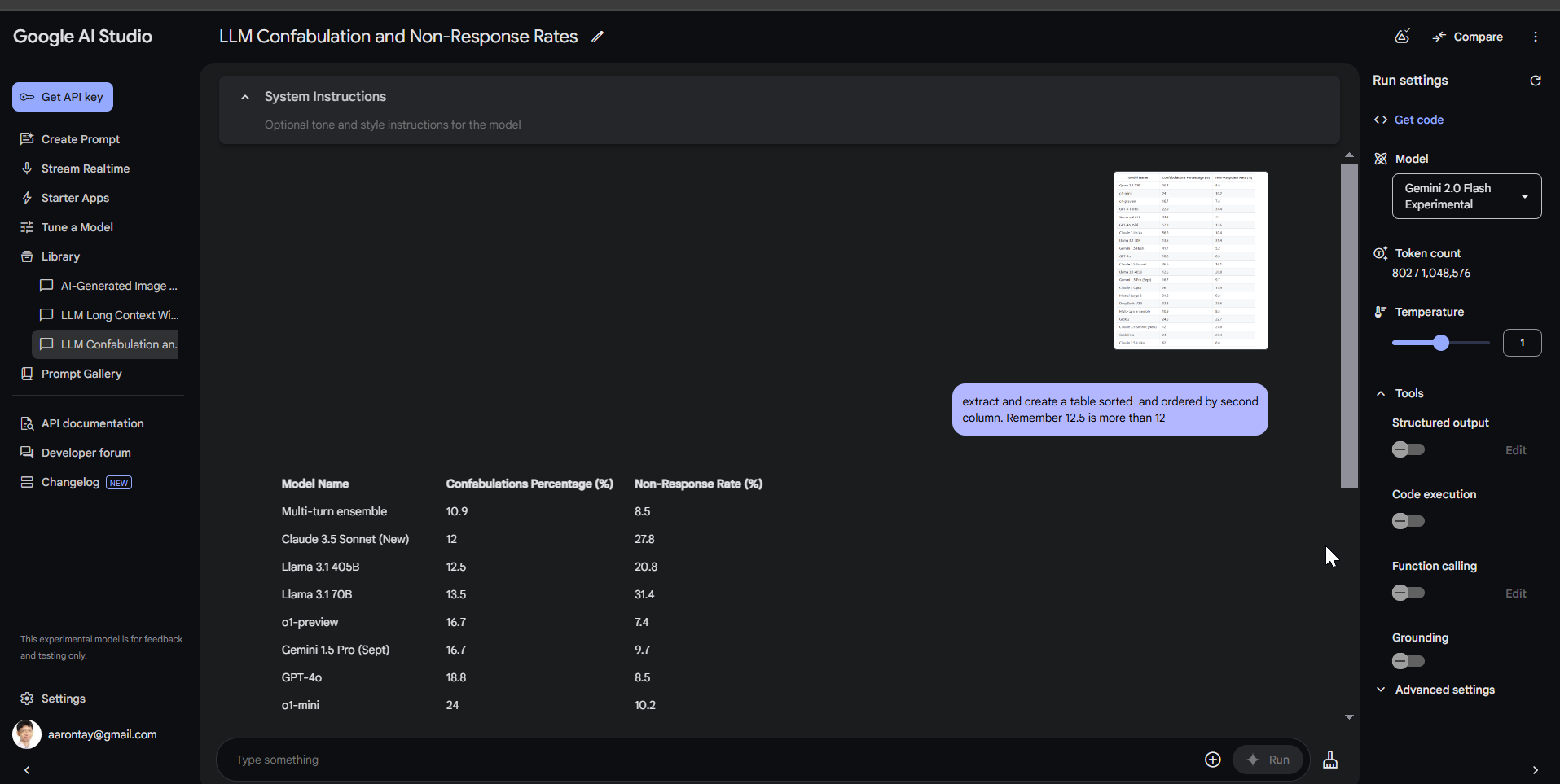
In the above example, I upload a image of a table, ask the brand-new Gemini 2.0 Flash experimental model to extract the data and then write code to plot a graph using the 2nd and 3rd columns.
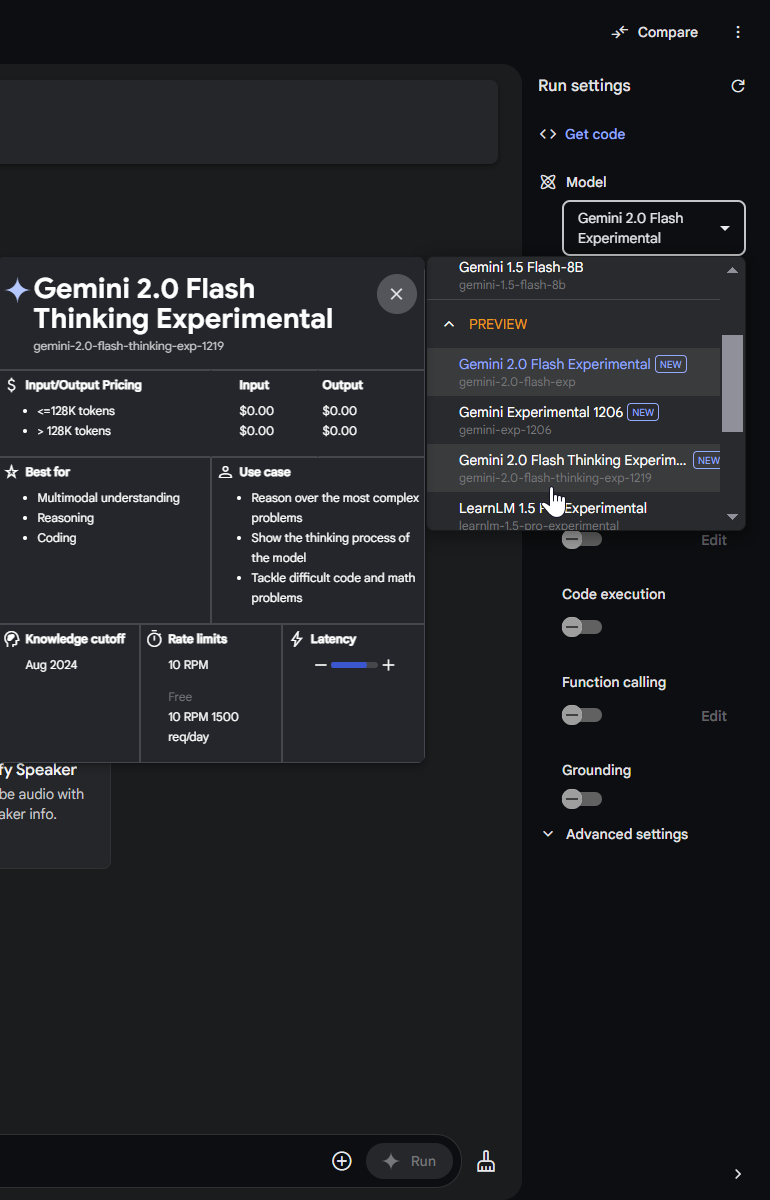
Why use Google AI studio? You get access to the latest Gemini models, which at the point of writing is Gemini 2.o Flash Thinking experimental all for free. This is the counterpart of OpenAI's o1 models that "think" before answering.
While using the capabilities of Gemini within AI studio is free, but if you click on the "Get Code" button and use the resulting code to run the API, you will be charged.
Compared to Gemini.google.com you also can tinker with advanced settings such as changing temperature and/or turning on options like code execution, grounding (this uses Google search function to find snippets from the web to support the generated answers), and created structured output and do function calling.
On top of these features, stream real-time, allows you to do real-time interaction with the Gemini models, where you can speak to Gemini and show it things via your web cam or share you screen!
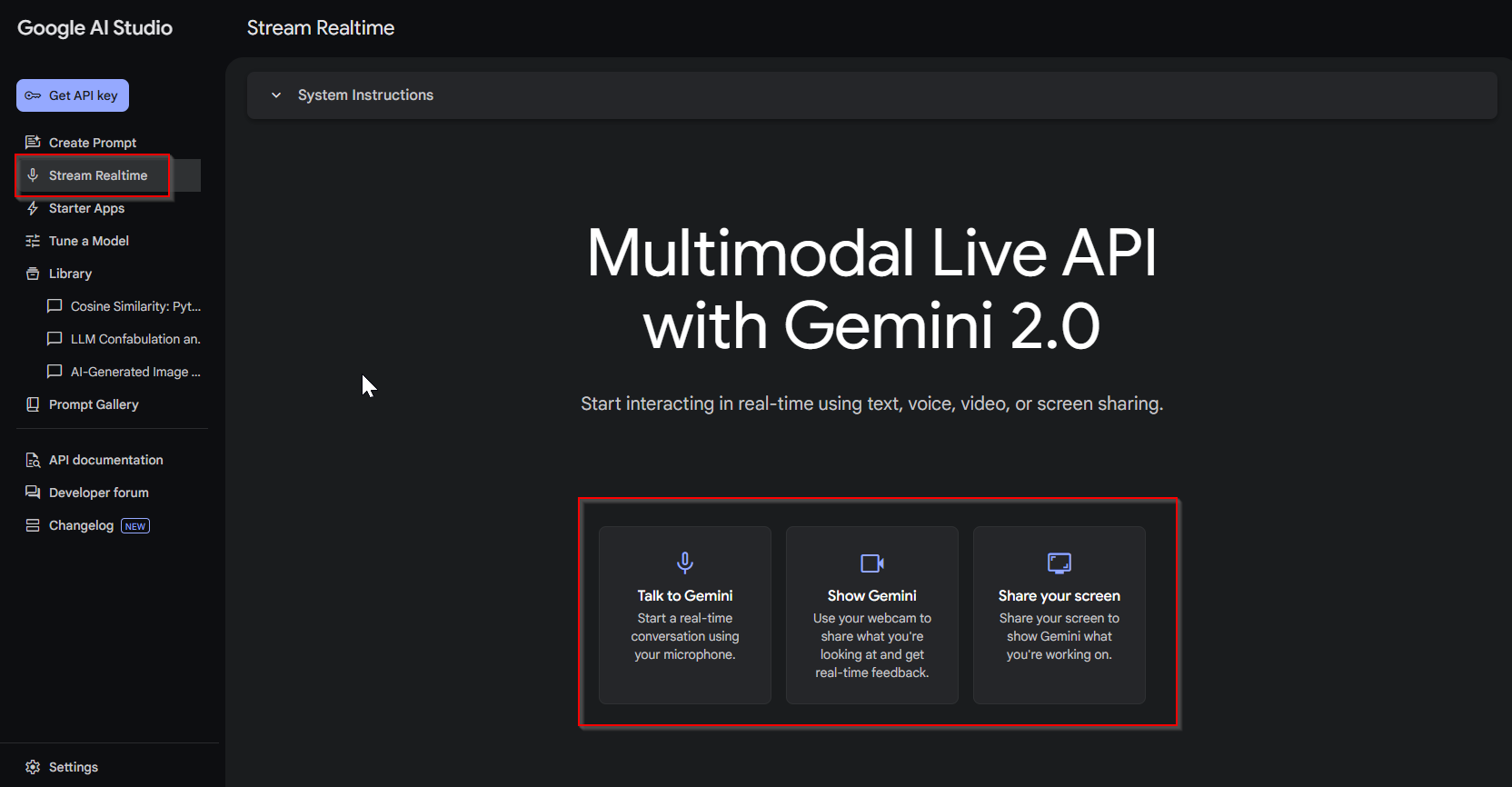
Conclusion
2024 has been a year of great advancement in AI, and Google, being a powerhouse in this area has obviously kept pace.
However, given Google's past reputation, and how fast tech advances I would not be overly reliance on these new tools, as the future of them is uncertain.